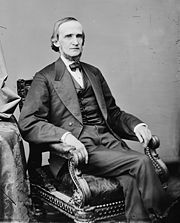
Oliver James Dickey
Encyclopedia

Republican Party (United States)
The Republican Party is one of the two major contemporary political parties in the United States, along with the Democratic Party. Founded by anti-slavery expansion activists in 1854, it is often called the GOP . The party's platform generally reflects American conservatism in the U.S...
member of the U.S. House of Representatives from Pennsylvania
Pennsylvania
The Commonwealth of Pennsylvania is a U.S. state that is located in the Northeastern and Mid-Atlantic regions of the United States. The state borders Delaware and Maryland to the south, West Virginia to the southwest, Ohio to the west, New York and Ontario, Canada, to the north, and New Jersey to...
.
Biography
Oliver J. Dickey (son of John DickeyJohn Dickey
John Dickey was a Whig member of the U.S. House of Representatives from Pennsylvania.John Dickey was born in Greensburg, Pennsylvania. He was appointed postmaster of Old Brighton, Pennsylvania, on April 11, 1818, and served until May 17, 1821. He served as sheriff from 1824 to 1827...
) was born in Old Brighton, Pennsylvania. He attended Beaver Academy and Dickinson College
Dickinson College
Dickinson College is a private, residential liberal arts college in Carlisle, Pennsylvania. Originally established as a Grammar School in 1773, Dickinson was chartered September 9, 1783, five days after the signing of the Treaty of Paris, making it the first college to be founded in the newly...
in Carlisle, Pennsylvania
Carlisle, Pennsylvania
Carlisle is a borough in and the county seat of Cumberland County, Pennsylvania, United States. The name is traditionally pronounced with emphasis on the second syllable. Carlisle is located within the Cumberland Valley, a highly productive agricultural region. As of the 2010 census, the borough...
. He studied law, was admitted to the bar at Lancaster, Pennsylvania
Lancaster, Pennsylvania
Lancaster is a city in the south-central part of the Commonwealth of Pennsylvania. It is the county seat of Lancaster County and one of the older inland cities in the United States, . With a population of 59,322, it ranks eighth in population among Pennsylvania's cities...
, in 1844 and practiced. He served as district attorney of Lancaster County, Pennsylvania
Lancaster County, Pennsylvania
Lancaster County, known as the Garden Spot of America or Pennsylvania Dutch Country, is a county located in the southeastern part of the Commonwealth of Pennsylvania, in the United States. As of 2010 the population was 519,445. Lancaster County forms the Lancaster Metropolitan Statistical Area, the...
, from 1856 to 1859. During the American Civil War
American Civil War
The American Civil War was a civil war fought in the United States of America. In response to the election of Abraham Lincoln as President of the United States, 11 southern slave states declared their secession from the United States and formed the Confederate States of America ; the other 25...
, Dickey served as lieutenant colonel of the Tenth Regiment, Pennsylvania Volunteers.
Dickey was elected as a Republican to the Fortieth
40th United States Congress
The Fortieth United States Congress was a meeting of the legislative branch of the United States federal government, consisting of the United States Senate and the United States House of Representatives. It met in Washington, D.C. from March 4, 1867 to March 4, 1869, during the third and fourth...
Congress to fill the vacancy caused by the death of Thaddeus Stevens
Thaddeus Stevens
Thaddeus Stevens , of Pennsylvania, was a Republican leader and one of the most powerful members of the United States House of Representatives...
and on the same day was elected to the Forty-first
41st United States Congress
-House of Representatives:- Senate :* President : Schuyler Colfax* President pro tempore: Henry B. Anthony - House of Representatives :* Speaker: James G. Blaine -Members:This list is arranged by chamber, then by state...
Congress. He was reelected to the Forty-second
42nd United States Congress
The Forty-second United States Congress was a meeting of the legislative branch of the United States federal government, consisting of the United States Senate and the United States House of Representatives. It met in Washington, D.C. from March 4, 1871 to March 3, 1873, during the third and fourth...
Congress. He was not a candidate for renomination in 1872
United States House election, 1872
The U.S. House election, 1872 was an election for the United States House of Representatives in 1872 which coincided with the re-election of President Ulysses S. Grant....
. He was a delegate to the State constitutional convention at Harrisburg, Pennsylvania
Harrisburg, Pennsylvania
Harrisburg is the capital of Pennsylvania. As of the 2010 census, the city had a population of 49,528, making it the ninth largest city in Pennsylvania...
in 1873. He resumed the practice of law in Lancaster and died in 1876. He was interred in Woodward Hill Cemetery
Woodward Hill Cemetery
Woodward Hill Cemetery is a historic cemetery in Lancaster, Pennsylvania. It was founded by the Trinity Lutheran Church of Lancaster at some time between 1849 and 1852, but became a non-denominational cemetery in 1856. It is well known for being the burial place of James Buchanan, the 15th...
.

